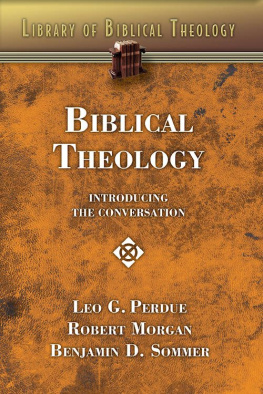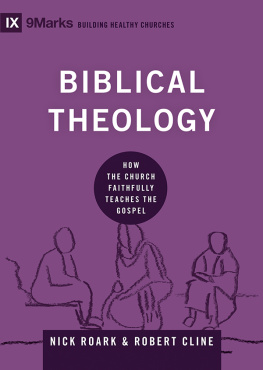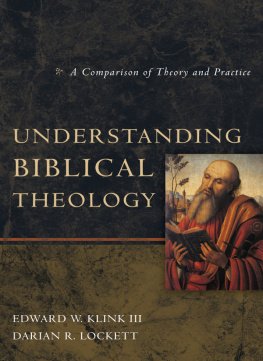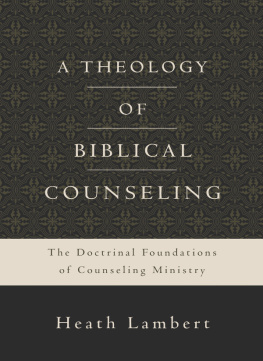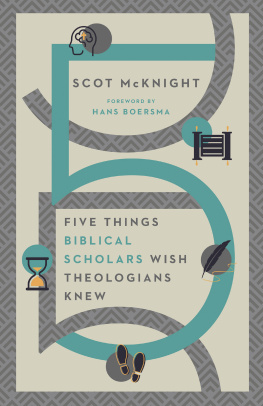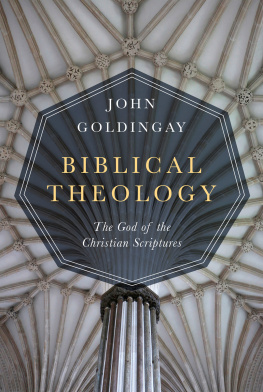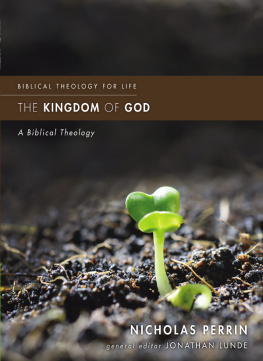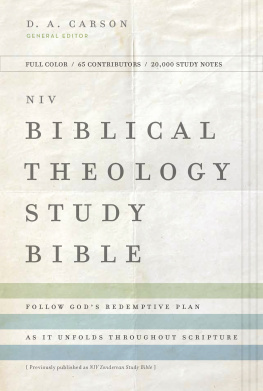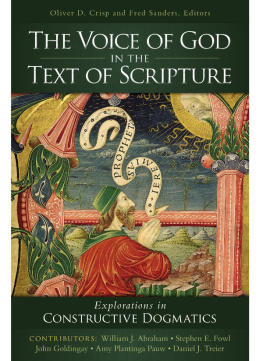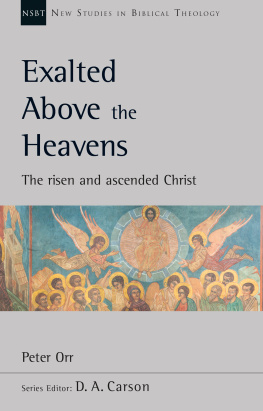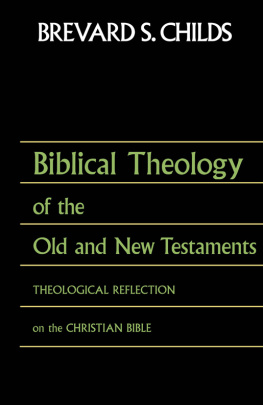James D. G. Dunn
L IBRARY OF B IBLICAL T HEOLOGY
B IBLICAL T HEOLOGY
INTRODUCING
THE CONVERSATION
L EO G . P ERDUE
R OBERT M ORGAN
B ENJAMIN D . S OMMER
Abingdon Press
Nashville
BIBLICAL THEOLOGY
INTRODUCING THE CONVERSATION
Copyright 2009 by Abingdon Press
All rights reserved.
No part of this work may be reproduced or transmitted in any form or by any means, electronic or mechanical, including photocopying and recording, or by any information storage or retrieval system, except as may be expressly permitted by the 1976 Copyright Act or in writing from the publisher. Requests for permission should be addressed to Abingdon Press, P.O. Box 801, 201 Eighth Avenue South, Nashville, TN 37202-0801 or permissions@abingdonpress.com.
This book is printed on acid-free paper.
Library of Congress Cataloging-in-Publication Data
Perdue, Leo G.
Biblical theology : introducing the conversation / Leo G. Perdue, Robert Morgan, Bejamin D. Sommer.
p. cm.
Includes bibliographical references and indexes.
ISBN 978-0-687-34100-9 (pbk. : alk. paper)
1. BibleTheology. 2. BibleCriticism, interpretation, etc. I. Morgan, Robert, 1940 II. Sommer,
Benjamin D., 1964 III. Title.
BS543 .P445 2009
230'.041dc22
2009010386
All scripture quotations unless noted otherwise are taken from the New Revised Standard Version of the Bible, copyright 1989, Division of Christian Education of the National Council of the Churches of Christ in the United States of America. Used by permission. All rights reserved.
Ancient language fonts were developed in the public domain for scholars who comprise the Society of Biblical Literature, including SPTiberian for Hebrew, SPIonic for Greek, and SPAtlantis for transliteration.
AT indicates the author's translation of scripture.
09 10 11 12 13 14 15 16 17 1810 9 8 7 6 5 4 3 2 1
MANUFACTURED IN THE UNITED STATES OF AMERICA
PREFACE
Theologians know that the Bible is the core source document for theological construction and hence that they must be in conversation with the best in critical study of Scripture. For many biblical scholars, the point of what they do is to help the biblical text speak to today's church and world, and realize they would do well to be in conversation with contemporary theology. Yet too often the biblical scholars and contemporary theologians fail to engage one another's work in significant and productive ways. The purpose of the Library of Biblical Theology is to bring the worlds of biblical scholarship and constructive theology together into an interpretative relationship. This series approaches biblical theology as a discipline that describes the faith of the biblical periods on the one hand, and on the other hand articulates how the theology of the Bible contributes to important understandings of modern faith and practice. Thus, the volumes in the series will move from setting forth major theological themes found in the biblical text to making a theological judgment based on one's own contemporary worldview, forged within a community of faith. These themes include God, salvation and eschatology, community, and ethics and law.
Until the 1970s, biblical study had been primarily, although not exclusively, placed in historical categories that included both method (historical criticism) and themes (especially salvation history). Not only had this historical approach sought to circumvent the authoritarian control of doctrinal interpretation set forth by the Church (see the famous address of Gabler in 1787), but also was in line with the major philosophical epistemologies of the Enlightenment (reason and experience). In recent years, biblical theology has begun to move in new directions with a vitality and force that are no longer held captive by a positivist understanding of history and the view of facts derived from reason and experience. More recent approaches now include foci on creation, canon, liberation, feminism, narrative, imagination, postmodernism, and postcolonialism. These approaches make use not only of historical methodologies and the history of religions but also of modern and postmodern understandings of literary analysis, epistemologies, and imagination. In addition, Jewish theology that is concerned with the theology of the Tanak increasingly has taken its place in the conversation. Biblical and contemporary theologies are not limited to events and ideas of history but seek also to move into current horizons of human understanding.
In introducing the theological conversation that includes the Bible, this volume surveys some of the major trends and studies that have appeared since the publication of Karl Barth's Epistle to the Romans in 1919. The four essays in this initial volume indicate that biblical theology in the past century has not only been a purely historical approach to Scripture that fails to engage the Bible's contemporary message and meaning. Rather, even prior to the present age, biblical theology had often taken seriously both the interpretation of Scripture in its particular historical context, and the importance of addressing that message to questions that confront contemporary human life and faith. However, in the present age of biblical study, the increasing emphasis placed on the role of the reader in the interpretation of texts has led modern scholars and students to recognize that their questions, important to the contexts in which they are active, are to be addressed to the texts of the Bible. And they continue to realize that the historical context and understandings of scriptural texts cannot be ignored in seeking to listen to voices from the past that have helped shape theological understandings through the centuries.
C HAPTER O NE
DIALOGICAL BIBLICAL THEOLOGY
A Jewish Approach to Reading Scripture Theologically
B enjamin D . S ommer
"Any disagreement that is for the sake
of heaven is destined to endure."
m.' Abot 5.19
INTRODUCTION
S trictly speaking, there can be no such thing as Jewish biblical theology. While many definitions of the term "biblical theology" exist, they all accord some privileged place to the Bible. All forms of Jewish theology, however, must base themselves on Judaism's rich postbiblical tradition at least as much as on scripture, and hence a Jewish theology cannot be chiefly biblical. (By Judaism's rich postbiblical tradition, I mean first of all rabbinic literature found in the Talmuds and midrashic collections, which stem from the first through eighth centuries C.E., and also postrabbinic Jewish commentaries, legal literature, mysticism, and philosophy from the eighth century through the present.) Conversely, any theology that focuses especially on scripture isby definition Protestant and not Jewish, for the notion of

